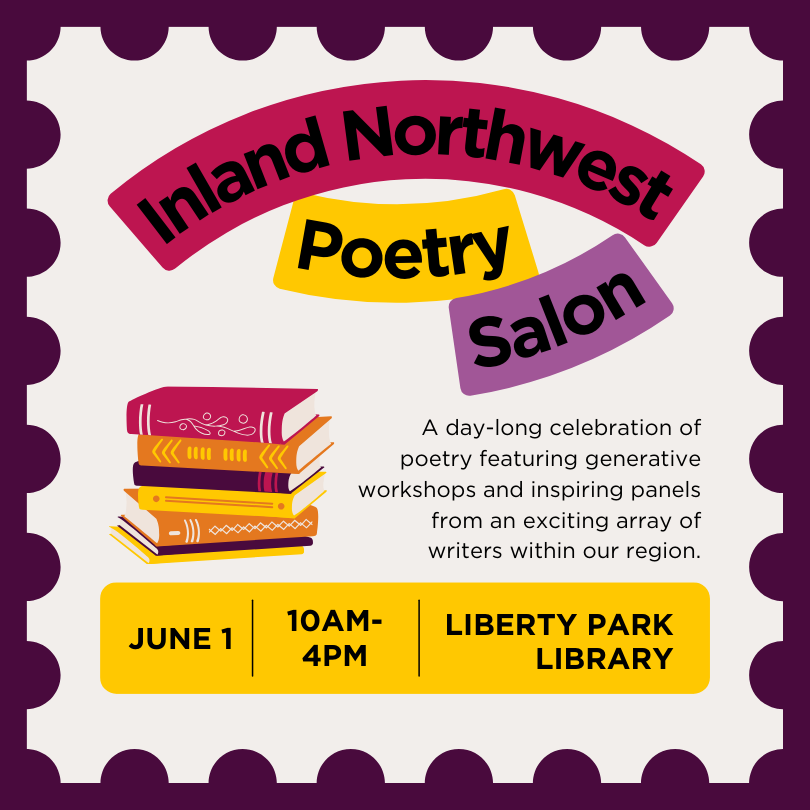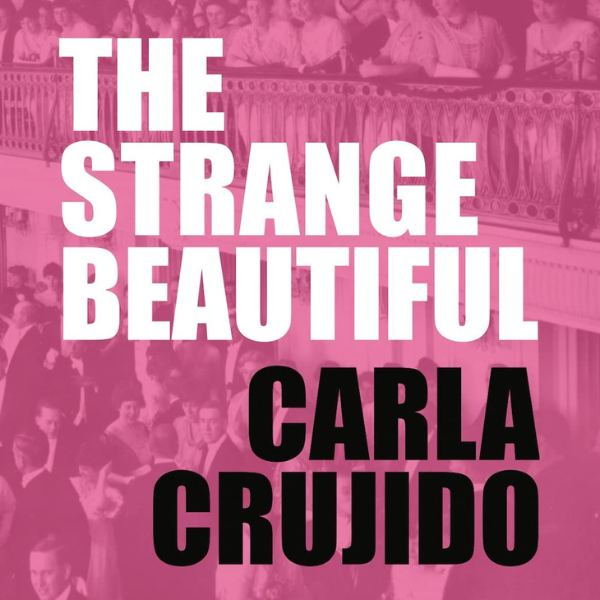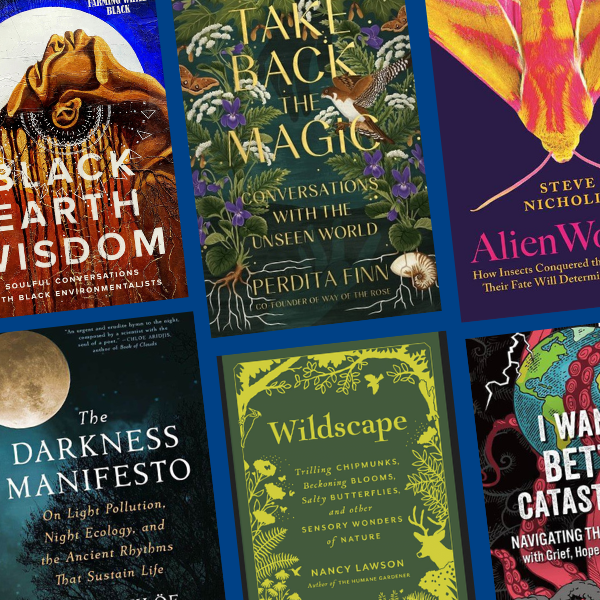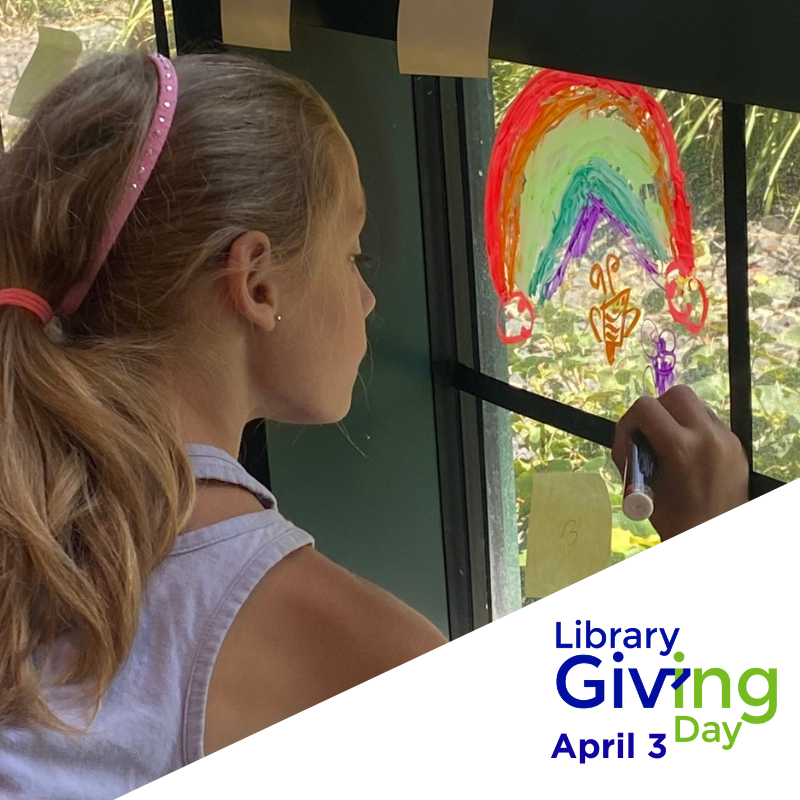Ever wonder what writing a novel in one month is like? Since 1999, participants of National Novel Writing Month (NaNoWriMo) have set out to write 50,000 words throughout the month of November, determined to end the month with a first draft.
Build your NaNoWriMo community at these upcoming Spokane Public Library events!
- Avenues to Publication with Travis Baldree | November 2 @ 5:30pm | Liberty Park Library
- Write Together | November 3 from 10am-12pm | Liberty Park Library
- Office Hours with Sharma Shields | November 9 from 10am-12pm | Central Library
- Write Together | November 13 from 10am-12pm | Central Library
- How to Write a Teen/Young Adult (YA) Novel | November 15 @ 5:30pm | Shadle Park Library
- Silent Writing Party with Sharma Shields | November 18 from 10am-1pm | South Hill Library
- Write Together | November 20 from 10am-12pm | Shadle Park Library
- So You Wrote a Book, Now What? | November 29 @ 5:30pm | South Hill Library
- Office Hours with Sharma Shields | November 30 from 10am-11:30am | Shadle Park Library
Our Writing Education Specialist Sharma Shields emailed the same micro-interview to novelists around the Northwest to help inspire NaNoWriMo participants as they embark on their novel-writing journey. Here are the great responses she received!
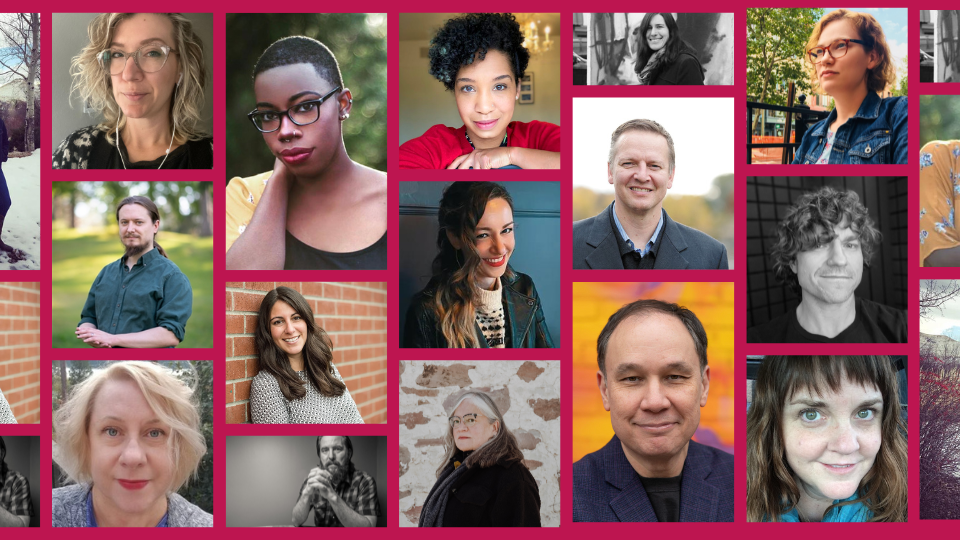
The responses come from the following writers and are published in no particular order:
- Jamie Ford
- Travis Baldree
- Debra Magpie Earling
- Shann Ray
- Jess Walter
- Kristen Millares Young
- Jo Segura
- Kris Dinnison
- J.T. Greathouse
- Joe Wilkins
- Leyna Krow
- Elle Beauregard
- Cam Montgomery
- Katrina Carrasco
- Jasmine Silvera
- Asa Maria Bradley
- Jen Comfort
- Stephanie Oakes
Jamie Ford
What does your ideal writing day look like?
I wake up and my Chinese grandfather has come back from the dead and wants to take me to a baseball game and then to dim sum where he tells me all the things about his childhood that I never asked. Then, with that kind of inspiration, I go home and write.
Name three objects near your [literal or figurative] writing desk.
- Zuzu, our one-eyed pug
- A matchbook from the Cosmo Club, the casino in Reno that my auntie once owned. It was a club for people of color who weren’t allowed in white casinos
- A handbook from when I went to Trauma Camp
Can you think of a time when you felt “stuck” as a writer, and how did you get unstuck?
Being stuck as a writer is like being in a bad relationship and hoping it gets better. Sometimes the only way to solve the problem is to leave, work harder, or cry.
What encouraging words do you have for writers who are participating in National Novel Writing Month?
I don’t have an MFA, or a BA for that matter. My last English class was in high school and yet Simon & Schuster still publishes my books. If I can do it, you can do it.
Travis Baldree
What does your ideal writing day look like?
I sit down in my audio recording booth, put on my headphones, fire up my playlist, check my scene summary in Scrivener, and write until the chapter is done.
Name three objects near your [literal or figurative] writing desk.
Nothing but a keyboard, monitor, and mouse!
Can you think of a time when you felt “stuck” as a writer, and how did you get unstuck?
I got stuck when I lost the heart of the story. To find it, I looked backward for an ache in my own life during which I felt acutely that I was at a fork in the road. Finding the right one for my characters to experience replaced the heart I had lost.
What encouraging words do you have for writers who are participating in National Novel Writing Month?
A simple idea isn’t an unworthy idea.
Debra Magpie Earling
What does your ideal writing day look like?
A rainy spring day writing from early morning into a moody dark night with the windows open to fragrant blustery winds that smell of bergamot and (strangely) Grand Marnier. But anywhere. I write anywhere. In any commotion.
Name three objects near your [literal or figurative] writing desk.
Rubber stamps that include a gaggle of disapproving old women (They say, “Poor woman, such poor writing), a coffee cup (It means, I need to sit with this section longer), and a ghost (Ghost whispers, “These sentences are tooOOoo elusive”). Stamp stamp stamp. I can quickly assess a piece for rewrite.
Can you think of a time when you felt “stuck” as a writer, and how did you get unstuck?
I love being stuck. It means I am thinking and something grand is about to show itself—a plot turn, a new character, or a surprise. Our creative brain is mysterious and vast, oceanic and roaring, simultaneously dark and illuminated. We don’t always know what we’re thinking because the mind reaches back (and forward) into time-immemorial blood pools. The creative tide is out but will rush back with flittery tiddlebits, endless periodic sentences, scenes of shipwrecks, ghosts, disasters, murders, mermaids, and titanic brilliant thoughts. Wait for it! In the meantime, while the vast stew of your creativity is burbling and blurping, go to the library. Let the museful librarian show you rooms of wonder.
What encouraging words do you have for writers who are participating in National Novel Writing Month?
Great and wondrous stories are everywhere. Spend an afternoon in the library doing serendipitous research. Immerse yourself in the stories that surround you or pick a year, a circa, a significant personal date and look through old newspapers. See characters spin by, whole stories, breath-taking mysteries, and strange and wondrous events. Scribble down what fascinates you. Set a timer for ten minutes and ask any character to tell you a secret they harbor. Turn off your editorial brain—the fussy-nitpicking-non-writerly self that stymies creativity and listen to the ocean of your own imaginings and longings.
Kristen Millares Young
What does your ideal writing day look like?
No plans, no calls, no nothing but me and my book.
Name three objects near your [literal or figurative] writing desk.
An owl feather, a velvet tray full of mica, and an effigy of Frida Kahlo.
Can you think of a time when you felt “stuck” as a writer, and how did you get unstuck?
When stuck, I read desperately, mostly library books. It works!
What encouraging words do you have for writers who are participating in National Novel Writing Month?
Read to live; live to write.
Shann Ray
What does your ideal writing day look like?
Start in the darker hours, 10 PM-1 or 2 AM; write a scene or two; listen to music; read from those I love, personal loves and those who are strangers to me, poets, short story writers, librettists, playwrights, essayists, scientists, and novelists.
Name three objects near your [literal or figurative] writing desk
More than three: Water, feather, wood, stone, bison skull, woodcut of James Welch, art of others, books, image of Our Lady of Guadeloupe, art of my daughters, song of my wife.
Can you think of a time when you felt “stuck” as a writer, and how did you get unstuck?
Go into the desolation with gratitude, humility, love.
What encouraging words do you have for writers who are participating in National Novel Writing Month?
Place the beloved’s face before you as you write, and write with fire!
Jess Walter
What does your ideal writing day look like?
Up at 5:30 with coffee and pastry, write for a few hours, have second breakfast, answer emails, get some exercise, read what I’ve written for the day. (And everywhere there is a comma, one can assume there is also a nap or a reading break.)
Name three objects near your [literal or figurative] writing desk.
Coffee cup. Journal. Dreyer’s English desk calendar (Sept. 26 entry: EEK/EKE “Eek!” Is what you exclaim when you see a mouse. To eke is to secure something with difficulty.)
Can you think of a time when you felt “stuck” as a writer, and how did you get unstuck?
Can I think of a time when I didn’t feel stuck? Muhammad Ali gave the best writing advice: Stick and move, stick and move. If I’m stuck on a novel, I work on a short story. If I get stuck on the story, I work on a script. If I get stuck on the script, I go back to the novel. Stay at the desk. And if none of those work, go to your napping chair and read something great for inspiration. If that doesn’t work, take a walk. No phones!
What encouraging words do you have for writers who are participating in National Novel Writing Month?
If you’re writing for a whole month, you don’t need encouragement from me. But I’d say: have fun! Jam! Riff! Play! It’s dumb that we writers call it work; when I go out to the keyboard, I like to imagine it’s a piano, and I’m just sitting down to play.
Kris Dinnison
What does your ideal writing day look like?
I get up, have coffee and breakfast, journal to get the junk out of my brain, then write for four or five hours, with stretch breaks and snacks, of course. Since it’s my ideal day, I’ll add that the words and ideas are flowing and all the writing is coming out so good the first time that I hardly have to touch it before sending it off to be published. A girl can dream, right?
Name three objects near your [literal or figurative] writing desk.
A cedar-scented candle, a deck of tarot cards, and a postcard that says “Writers Block: When your imaginary friends aren’t speaking to you.”
Can you think of a time when you felt “stuck” as a writer, and how did you get unstuck?
I have felt stuck many times. I find that my stuckness is often related to my perfectionism. So I remind myself that I don’t ever have to let anybody read what I’m writing and just write through it. Even if it’s really bad. I was able to write my first novel because I truly thought it was a “practice novel.” It took the pressure off and allowed me to write through my messes.
What encouraging words do you have for writers who are participating in National Novel Writing Month?
Not my words but Neil Gaiman’s: “Whatever it takes to finish things, finish. You will learn more from a glorious failure than you ever will from something you never finished.” And at the same time, I have done NaNoWriMo a few times, and I know how life can get in the way, so also know that any writing you get done this month is more than you had before. So just write. As much as you can. And pat yourself on the back for doing something most people never even attempt.
Jo Segura
What does your ideal writing day look like?
Wake up early in the morning before work, make a pot of coffee, turn on the computer, and get typing.
Name three objects near your [literal or figurative] writing desk.
Cup of coffee, earphones to listen to music, my dog.
Can you think of a time when you felt “stuck” as a writer, and how did you get unstuck?
I allow myself to put in a placeholder and move on. I can always come back to that spot later when I have a fresh perspective.
What encouraging words do you have for writers who are participating in National Novel Writing Month?
Try not to fixate too much on hitting the daily word count and other badges every day. Work at your own pace, and enjoy the process.
J.T. Greathouse
What does your ideal writing day look like?
My ideal writing day looks like waking up around 7:00am, drinking some coffee while I goof off on the internet for about half an hour, then starting to write once the caffeine kicks in. In the morning I’ll write for about an hour at a time, then take breaks to do chores, or read, or play video games. Usually I do three or four cycles of this. If I get some really good momentum going, I might keep going in the evening after taking a break for the afternoon.
Most of my actual writing days look like trying to write 500 – 1000 words in the morning before work, from about 5:30am to 7:00am.
Name three objects near your [literal or figurative] writing desk.
- My cat’s exercise wheel
- Two boxes of my books (my publisher sent me way more than I know what to do with!)
- A bunch of notebooks, each one a quarter to half full with random notes and ideas
Can you think of a time when you felt “stuck” as a writer, and how did you get unstuck?
Oh yeah! On every novel I’ve ever written, I start feeling super lost and stuck around the 60% mark of the draft. The excitement and momentum from starting the project has worn off by then, and been replaced with a clinging dread that the book is terrible and unfixable, which tends to slow me way down. Sometimes at this point I’ll go days without writing. In my experience, the best way to get unstuck is to read a book I really love to refill the well of inspiration, and then go back and power through that saggy middle section of the book. Usually motivation and momentum kick in again once I hit the last quarter and I can see the end in sight.
What encouraging words do you have for writers who are participating in National Novel Writing Month?
Writing isn’t always fun, but finishing a project is super rewarding! I just finished the first draft of a book I’ve been wrestling with for the last ten months, and while the writing process wasn’t always fun I’m super proud of having finished it, and think that with some revision it will turn out really great. Even if you don’t love your book the whole time you’re writing it, when it’s finished you won’t regret having written it – even if it takes a lot of work and revision to make it good!
Elle Beauregard
What does your ideal writing day look like?
10AM-12:30PM Writing time (my goal is approx. 2000 words/day, 4 days/week when I’m drafting)
1PM-3PM administrative and project work to support my author business.
Name three objects near your [literal or figurative] writing desk.
- Water tumbler (I fill it before I sit down to write in the morning)
- Writing gloves (my hands get cold while I’m writing)
- Seasonal Mood Light (I let it shine while I check email first thing in the morning before diving into writing, especially in the darker months)
Can you think of a time when you felt “stuck” as a writer, and how did you get unstuck?
- Talked it out! Talking a story problem out with a supportive writer friend has always helped me.
- Listen to music that reminds me of my project (yay playlists!)
- Go for a drive alone (and listen to that project playlist if I can!)
- Clean my house. Cleaning always seems to unlock my brain.
What encouraging words do you have for writers who are participating in National Novel Writing Month?
Set your own goal, and celebrate every milestone! If 50K words isn’t realistic for you, that’s okay! The point of NaNoWriMo is to create a writing habit, even if that’s just 100 words per day.
Joe Wilkins
What does your ideal writing day look like?
My ideal writing day begins with me getting my two lovely, grumpy middle-schoolers off to school. Then, with a cup of strong black tea with milk at hand, I sit on the front porch and open my journal, where I jot down images and things my kids have said and questions I’m mulling over and whatever else happens to strike my fancy. After, to ready my brain for all that language can do, I read some poems. I usually have three books going at once—right now, Diane Seuss’s Frank, Liz Howard’s Infinite Citizen of the Shaking Tent, and Kathleen Flenniken’s Post-Romantic—and just read a poem or two from each. Now, I’m ready to slip back inside, sit up to the computer, and work on the novel. If circumstances allow, I can usually put in four or five hours before I’m imaginatively worn out. And though even my ideal writing day does indeed begin with the wonderful, mad morning rush here at home, my ideal writing day ends with a good couple of hours fly-fishing a mountain river, before I’m magically transported back for dinner with my family.
Name three objects near your [literal or figurative] writing desk.
- A handful of small, bright rocks pulled from various rivers
- A pencil case in the shape of the state of Mississippi
- A picture of my kids atop an Adirondack peak
Can you think of a time when you felt “stuck” as a writer, and how did you get unstuck?
Whenever I feel stuck or unsure where to go, I switch something up. I like to have a couple of writing projects going at once, and so often I’ll just close down one file and open the other. Sometimes, I’ll print out whatever I’m working and read through it on paper. Or I’ll switch genres entirely and leave the novel to go play with poems.
What encouraging words do you have for writers who are participating in National Novel Writing Month?
I think you all are crazy—it take me so long to write a novel!—but I admire the heck out of you. Just keep writing.
Leyna Krow
What does your ideal writing day look like?
The lovely hours between 9am and 2:30pm when both my kids are at school! I used to always write at night so this time feels like such a luxury. I eat a lot of snacks. Sometimes I start the day with a workout but sometimes not. I write in my office unless my husband is working from home, then I write on the couch.
Name three objects near your [literal or figurative] writing desk.
Water glass for hydration, phone for distraction, old dog napping on dog bed for company
Can you think of a time when you felt “stuck” as a writer, and how did you get unstuck?
I am constantly getting stuck and unstuck! It’s part of the process for sure. Movement helps me unstick. A run or a walk or a long drive. I like to put music on and then ignore it. Give my mind some space to wander, but not too much space.
What encouraging words do you have for writers who are participating in National Novel Writing Month?
Write what’s fun. Don’t worry about if it’s going to be any good or if other people will want to read it. There will be time later to make it those things. The first draft is just for you so do what you like! That’s the best way to keep yourself coming back to the desk.
Cam Montgomery
What does your ideal writing day look like?
I like to write after I’ve cleaned my apartment. Clean, clutter-free studio helps organize some of the mental chaos of writing.
Name three objects near your [literal or figurative] writing desk.
A giant beverage (40oz of writing fuel); Hades, my giant dog; my back brace!
Can you think of a time when you felt “stuck” as a writer, and how did you get unstuck?
When lockdown started, I felt superstuck. Talked to an author friend who recommended Lore Olympus. Talking to her + that gorgeous art + its outlandish storytelling = the spark of my inspiration.
What encouraging words do you have for writers who are participating in National Novel Writing Month?
Winning is fun but it’s not the sole reward of NaNo. That daily word count suggestion is only a suggestion. You do you. Create the story of a world you’re excited to keep living in and working on long after November has come and gone.
Katrina Carrasco
What does your ideal writing day look like?
If I’m away on a writing retreat, I like to wake up, read with my coffee and breakfast, and then write all morning while my brain is most awake. I usually stop for a late lunch and then read in the afternoon, and do something social to unwind in the evening. If I’m at home, I work full-time at a non-writing day job, so I schedule writing nights twice a week, one after work and a longer one on the weekend, and make sure I’m at my desk at those times to get writing done while I can.
Name three objects near your [literal or figurative] writing desk.
My little collection of rocks and shells, a big mug of tea that’s probably going cold, and a cloth for cleaning my glasses.
Can you think of a time when you felt “stuck” as a writer, and how did you get unstuck?
Sometimes when I’m stuck I just need to leave a project alone for a while and let myself figure it out in the back of my mind. Other times, great ideas present themselves to me when I’m walking and thinking aloud. And other times, reading something else helps unlock or reveal the way forward in my own story.
What encouraging words do you have for writers who are participating in National Novel Writing Month?
I did NaNoWriMo for about seven years while I was first starting to write more seriously. Only one of my NaNo projects became a full manuscript, but those years of work helped me find and hone my voice as a writer. Any time you spend writing is not time wasted, no matter if you complete a manuscript or not. And it’s great practice to have a word goal and push through sticky moments to get there. Also, make as many writing friends through NaNo as you can! Writing community is so important when you’ll spend so much of your time alone in the work — it’s good to surface from that solitary time and have community.
Jasmine Silvera
What does your ideal writing day look like?
Wake up, stretch, feed and walk the dog (and myself!), write until early afternoon, get goof-off time online with friends, or my kiddo, watch a movie, read a book, go to bed. (I can count on one hand the number of times this day has happened over the course of six books, so don’t let the absence of an ideal day stop you!)
Name three objects near your [literal or figurative] writing desk.
My desk is usually themed with reminders of my current project and right now that’s the final book in the Tooth and Spell trilogy: My “witch please” mug, the crochet pineapple from Binding Shadows (a gift from fellow author and friend Colleen Moore) and one of the “daughters” of my overgrown Pilea plant, who is my temporary coworking buddy (until I can find her a good home!)
Can you think of a time when you felt “stuck” as a writer, and how did you get unstuck?
I’ve learned that when I’m stuck it’s a sign I need to take a short break: a walk, a trip to a museum or bookstore, even a nap. I let my subconscious do the work while I get inspired and grounded (or rested) and often come back to my desk to find myself engaged and ready to tackle any problem that left me feeling stuck. Sometimes—if I’m really lucky—a solution occurs even before I sit back down to write. Those are really good days!
What encouraging words do you have for writers who are participating in National Novel Writing Month?
Congratulations! Just by starting your novel, you’ve made an enormous step toward the most important thing of all—finishing it. Get those words out—don’t be distracted or dismayed if they don’t come out the way you planned, or as tightly as you intended. The time to edit, revise and polish will come later. For now: Write! Write! Write!
Asa Maria Bradley
What does your ideal writing day look like?
In my dream world: Serenity. Quiet. I craft beautiful prose in my small cottage by the sea while a warm ocean breeze wafts through the window.
In real life: Absolute chaos. I type madly during small chunks of stolen time from my day job and life. My office is a mess and I’m always behind on deadlines.
Name three objects near your [literal or figurative] writing desk.
- Pepsi Zero Sugar for caffeine
- Small notebook to keep track of ideas and edits I need to go back to in the manuscript
- Dog for company (and farts)
Can you think of a time when you felt “stuck” as a writer, and how did you get unstuck?
The first draft is always super hard for me. One thing that helps is following author Steff Green’s skeleton draft process. In a skeleton draft, you can only move forward in your draft, never back. You focus on progress, not perfection. Also, since it’s not a “real” draft, some of the pressure to produce perfect prose is gone.
What encouraging words do you have for writers who are participating in National Novel Writing Month?
Keep writing and focus on progress, not perfection!
Jen Comfort
What does your ideal writing day look like?
I have ADHD, so my “ideal” writing day looks very little like my “actual” writing day. I usually set up on my couch under the heat blanket, hunched over my laptop like a gremlin for four hours whilst ignoring all my bodily needs (water, bathroom, food, missed texts & calls…), take a lunch break to walk to my dog, then do another 2 hours of writing before I have to tap out (I also have rheumatoid arthritis, so my finger joints have a limit).
Name three objects near your [literal or figurative] writing desk.
My dog, a heat blanket/heated desk pad, and a rotating beverage buffet (at least three drinks, including sparkling water, coffee/tea, and regular water w/ hydration powder).
Can you think of a time when you felt “stuck” as a writer, and how did you get unstuck?
I can often feel my brain run out of creativity when I’ve been writing a lot. So to refresh it at night, I eat some special chocolate and sit in the hot tub, then let my imagination play with story ideas and voice-dictate notes into my Google Keep app.
What encouraging words do you have for writers who are participating in National Novel Writing Month?
I have never been one of those people who can write whenever or wherever–and I truly believe that’s okay! Especially for neurodiverse folks, we often know deep down what we need to get the words flowing but will keep trying to ignore those needs because they feel too fussy or they don’t match our idealized picture of what writing looks like. So, if you’re a hothouse flower who can only write in ideal conditions… that’s perfectly fine! The blooms you create are just as worthy.
Stephanie Oakes
What does your ideal writing day look like?
Ideally, I already know what scene or section of the book I’m going to work on before I sit down. For me, deciding what to work on that day takes up a lot of my brain power, and I need to conserve that so there’s some left to do the actual writing. Ideally, I layer in mini-sessions of reading, too. This just makes writing feel more fun and collaborative, like I’m checking in with coworkers who are doing the same thing as me.
Name three objects near your [literal or figurative] writing desk.
A cup of coffee, an egg timer (for writing sprints), and a dog or two.
Can you think of a time when you felt “stuck” as a writer, and how did you get unstuck?
Often, for me, if I really dig beneath a “stuck” feeling, there’s a bigger feeling underneath (like fear of failure, perfectionism, burnout). My writing has greatly improved since I’ve learned to be more self-reflective (journaling, meditation, walking). Getting past the Big Feeling can take some work, but for me awareness is a really helpful first step.
What encouraging words do you have for writers who are participating in National Novel Writing Month?
I’ve tried NaNo a few times. While I’ve never “won” (finished 50,000 words in the month), the times I felt most successful were when I was having fun. There are always times when writing feels like work, but if it’s like too much of a slog, that’s usually a sign to me to mix it up, take some of the pressure off, and find a little more enjoyment in what I’m doing.

